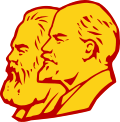| Part of a series on |
| Marxism–Leninism |
|---|
 |
A socialist state is a communist state formation that is the product of a purported base and superstructural relation that is called the socialist mode of production, or simply socialism. Socialism acts as the base of the socialist state, while the superstructure is made up of two parts: the class character of the state and the organisational form of state power. The class character of the state, which is the dictatorship of the proletariat (or a variant thereof) in which the proletariat acts as the ruling class, in which purportedly the most advanced elements of this class form a vanguard party (communist party) to lead the state. The exception to this rule was the Soviet Union. From 1961 onwards, the Communist Party of the Soviet Union (CPSU) argued it had created a developed socialist society where the proletarian dictatorship had been replaced by a socialist state of the whole people since all the exploitative classes had been defeated. The Chinese Communist Party vehemently opposed this theory and argued that every state formation had to have a ruling class. The organisational form of state power, literally the form of government in Marxist–Leninist vocabulary, is centered on the unified power of the supreme state organ of power that works under the party's leadership.
The majority of communist states have been unable to establish a socialist state. These states had, according to Marxist–Leninist teachings, reached a lower form of development and designated themselves, or were designated, for example, as national democratic states, states of socialist orientation or as people's democratic states.
© MMXXIII Rich X Search. We shall prevail. All rights reserved. Rich X Search
